A Poet’s Preoccupations: Alys Faiz’s Personality Sketch of Faiz Ahmad Faiz
Great artists are often shrouded in mystery. While we marvel at the gift of their creative output, we can never quite grasp the machinations of their minds and hearts. Where do their draw their curiosity, courage and inspiration from, are questions we carry even as their work seeps into our life and gives it beauty and meaning.
The poet Faiz Ahmad Faiz needs no introduction. However, the man, the husband, the father and friend, Faiz Ahmad Faiz, can only be pieced together through the stories, anecdotes and reflections of his closest confidants. In 1956, Alys, Faiz’s lifelong companion, created a personality sketch of her husband, leaving us an intimate window into the soul of a gentle artist. She begins her sketch thus:
“I make no claim to understanding his poetry, but I contend that I do understand the poet. It is, after all, the personality of any poet which is the main-spring of his poetry and the dynamic force of his intuition.”
While Alys confirms our suspicion that Faiz, like other creative geniuses, is often forgetful and absent-minded, she adds that it is worthwhile to tolerate, and even accept these shortcomings, for the end of his meanderings is often a masterpiece. Through wonderfully mundane anecdotes about their domestic life, she also correlates his carelessness with the great generosity of his spirit.
“I sometimes think that Faiz’s carelessness betrays his openheartedness, for he does not bother about the material value of anything. The only exception are his books, which he looks after with greedy eyes and which he keeps close to himself miser-like sitting upon his money. But when anyone asks for a book, he cannot refuse. When I ask him why he gives his books out so readily, particularly when he is not sure that they will ever be returned, he answer promptly and seriously, "There's no harm in lending them so long as someone is sure to read them.”
This generosity also becomes the hallmark of their partnership. Alys reflects on the lack of conflict in their marriage, and concludes that what others see as a lack of passion, is ultimately a rare synergy.
“Some people have asked if I have ever seen Faiz angry. He is well known for his tenderness; everybody knows that he never gets angry. I assured these friends that he has never hurt any delicate thing in his domestic life. On hearing this, a friend told me that I have been deprived of the pleasure of making up after a quarrel. It's true; we've been deprived of this pleasure. But it's also true that we have been immuned from that remorse one suffers as a result of speaking out in fury and haste. We do talk over our differences, but things do not go beyond that. Eventually, we come to an agreement.”
Through the many trials and tragedies that mar their life, Alys makes a note of Faiz’s unwavering belief in goodness.
“He has developed a kind of optimism and patience, both genuine and reflected in his philosophy of life and his aspirations as well. He is convinced of the innate nobility of man, a nobility that is defaced under certain unfavorable circumstances, but which is never entirely vanquished.”
Her affection and admiration for Faiz is also beautifully balanced by her practical orientation towards domestic life with an eccentric artist.
“Since the artist's preoccupations are mental, he goes beyond the limits of this world and is not concerned about himself or the day-to-day needs of his domestic life. He needs companions who can take care of his worldly affairs. If, as a result, hurdles are easily jumped, then the artist or poet can get lost in his subjective world; he can even be satisfied that his worldly problems are over. This is why writers dedicate their books to those whom they love dearly, to those without whom their writings would have remained incomplete. I am sure that Faiz meant this very thing when he sent me the manuscript of Dast-i-sába on which he wrote, "It's yours."
While Alys’ personality sketch is meant to give Faiz’s readers an insight into his personal life, it is ultimately a tribute to the highest ideals of love and kindness, much like Faiz’s poetry.
You can find the full text of Alys Faiz’s personality sketch of Faiz Ahmad Faiz here.



